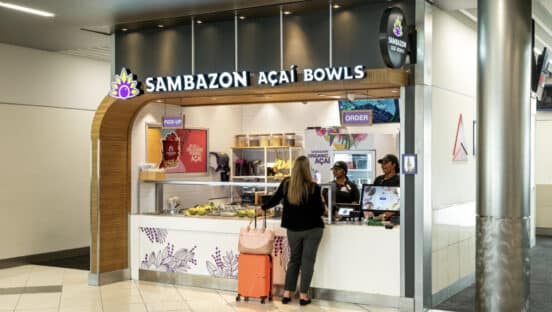Last year, you could find a dozen Auntie Anne’s pretzel stores in China. This year, you won’t find any.
After wading through one of the world’s biggest bureaucracies, all the while facing fierce competition and various cultural barriers, Wen-Szu Lin and his business partner decided to call it quits as Auntie Anne’s mainland China master franchiser.
“Even though we were doing OK, we decided to walk away,” Lin says.
Lin, now the international director of operations in Asia for FOCUS Brands International, serves a cautionary tale at a time when businesses see China as a land of limitless opportunity. While growth in China can indeed be a potential boon to business, many operators are finding that the growth comes with a unique set of headache-inducing challenges.
Lin lays out several of these challenges in his book, The China Twist, which he plans to self-publish in December.
For example, in 2008, he was forced to destroy some 1,300 pounds of Auntie Anne’s caramel sauce after inspections determined that levels of the preservative sorbic acid were too high—even though U.S. testing showed perfectly acceptable levels.
A similar situation arose when regulators claimed the imported pretzel mix, which consists of only nondairy products like flour, salt, and sugar, contained bacteria only found in dairy products. If the product hadn’t passed a second inspection, Lin would have been forced to dump 42,000 pounds of the mix down the drain.
The franchisor managed to save the mix after calling friends and friends of friends—anyone with relationships inside the Chinese government. Inspectors eventually informed him that his second sample had passed, even though they had never collected a second sample.
It was a lesson learned. Lin says he and his business partner were always at a disadvantage when it came to business in China.
“You really need to have that prior experience and those prior relationships,” Lin says. “When we showed up, we didn’t really have any prior relationships.”
Experiences like Lin’s remind that stark differences remain between operating in China and operating in Western nations. Many American businesses have no doubt faced similar regulatory hurdles there.
Still, many brands are thriving in China, and some operators say the nation is becoming more cooperative, with a government more open to foreign investment.
“The one thing about China is everybody’s got a different experience,” says Giorgio Minardi, president of Dunkin’ Brands International, which operates 55 Dunkin’ Donuts and 87 Baskin-Robbins stores in China.
Minardi, who has worked internationally with several quick-service brands, says China has embraced globalization, making it increasingly easier to open new stores. Much of that is thanks to pioneers like McDonald’s and KFC, which paved the way for U.S. brands in China, he says.
“When they were there, there weren’t any roads,” he says. “They couldn’t even buy eggs.”
One of the biggest challenges Minardi sees in China today is the demand for real estate. “Everybody wants to open up a shop or a chain or a brand in all categories, not just food,” he says.
Like any other country, challenges in China are often region-specific. Regional labor and immigration issues have affected some Chinese Fatburger stores, says Andrew Wiederhorn, CEO of the Hollywood, California–based chain. A labor shortage in Macao, for example, made it challenging to find employees for Fatburger’s store in the Venetian hotel there.
Fatburger brought in experienced American senior management and hired locally experienced employees to help wade through the country’s myriad challenges.
“You have to have dedicated people on the ground,” Wiederhorn says. “You can’t just do it remotely.”
Wiederhorn cautions against the popular narrative that China offers an endless supply of demand. “Good brands will succeed and weak brands will not succeed,” he says. “Chinese consumers are bright and they’re picky.”
And though the country has more people (1.3 billion) than any other nation on Earth, not all of them dine out. More than 100 million people in China live on less than $1 U.S. each day.
“It’s who can afford your product. Do I choose rice or do I go to McDonald’s?” says Justin Holtkamp, vice president of international marketing for International Dairy Queen, which operates more than 500 Chinese stores.
Since debuting in China in 1991, Dairy Queen has seen regulations decrease, Holtkamp says, and the company is now relying on more locally sourced products.
The business environment has shifted in a way that more closely resembles the challenges of operating in other developed markets.
“I think the biggest challenge is competition,” Holtkamp says. “China’s a hot market. Our biggest challenge is maintaining our leadership and making sure we’re relevant.”






